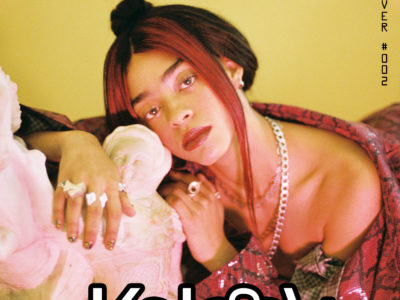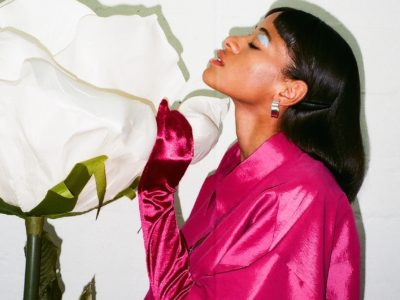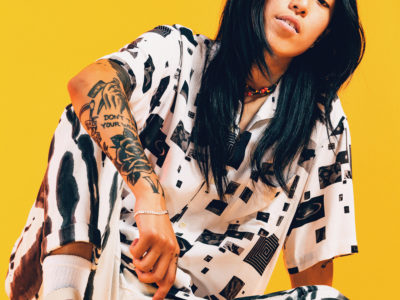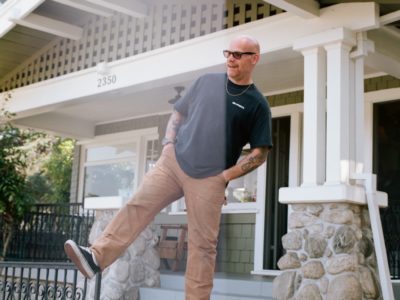Masaya Kuroki + Gildas Loaëc, Co-Founders of Maison Kitsuné
FEATURED + LEAD IMAGE COURTESY OF ALCIBIADE COHEN

Feature
Maison Kitsuné is the cult brand that for 15 years has combined French classics and Japanese cool, spanning the worlds of clothing, music, and cafés.
How Two Friends Built An Empire
WORDS BY: BLAKE ABBIE
Masaya Kuroki and Gildas Loaëc started Maison Kitsuné in 2002, after a fateful trip to Japan. Kitsuné, Japanese for fox, started as a music label celebrating young artists and a small clothing collection. It’s now expanded into a mini empire that includes club nights and cafés all over the world. All aspects of the Maison are infused with both French and Japanese attitude, reflecting the pair’s heritage; timeless and grounded in the familiar, yet always anticipating the next cool thing. Now 15 years on, with 10 boutiques and countless music releases, the two founders reflect on how music brought them together, their “magic recipe” for experimentation, and where they hope to go in the future of Maison Kitsuné.
How did you both get to Paris?
Masaya: When I was ten, my parents separated and asked if I wanted to stay in Tokyo with Dad or if I wanted to go with my mother to Paris, who was an oil painter. At that age, you want to stay with your mother. I had never seen anything outside Japan—I had a normal Japanese life. Without knowing anything about Paris, I suddenly ended up in the 19th District. It was tough at the beginning: I couldn’t speak the language, no friends, and culture shock. I spent more time skateboarding than in school. [Laughs] And I discovered a small record store where I went to listen to everything from everywhere: rock, jazz, funk, hip hop, techno, house. Music saved my mind.
Gildas: I’m from Bretagne, far west of Paris. I was also passionate about new bands and indie music, so when I moved to Paris around 19, I opened a record store, Street Sound, selling vinyl to DJs. I had absolutely no experience running a business or in making, buying, or selling vinyl. I was like, “Wow, I’ll go to Paris because that’s where it’s happening.” There was no plan. I started from scratch—the hard way! I don’t know why I did that!
Incredible! So music is where it began for you both.
Gildas: I was totally into it. And by accident, just in front of my store was a skate shop called Scrape My Shins—just by The Louvre. It was the street where the cool kids hung out and that’s where I met Masaya.
Masaya: Gildas’ record store had cool imports and the latest remixes from the UK or US—bootlegs. Everybody hung out there, like Daft Punk, Phoenix—everybody! But being from Paris, I would dream about New York. New York was everything and where I went in 1994, after high school. I took my savings and put all the cash in my pockets—very cliche actually!
There was no plan. I started from scratch—the hard way!
Why New York?
Masaya: The artists I respected were from New York. It was the beginning of Supreme, of Zoo York—all these big brands were from there. Street culture was strong. Everything and anything was being sold on the street. So I went and spent a year observing. I never thought at that time that I’d have my own brand and product. I saw Wall Street but didn’t understand it, so I started to read the newspaper and study what commerce is. Basically, street culture brought me to street commerce and then street commerce brought me to understand what business is.
Street culture brought me to street commerce and then street commerce brought me to understand what business is.
Were you interested in clothing at that time?
Masaya: When I was in Paris, I worked in a vintage store. But when I came back from New York, strangely I started to study architecture because I was fascinated by buildings like The Metropolitan Museum. A lot of people have ideas, but are not always able to make them happen, express, or explain them. Architecture studies taught me how to organize myself, make a schedule, write down my ideas, find a team to do production and development research, and deliver the idea to a client—to make what you have in your mind happen.
Gildas, what were you doing at that time?
Gildas: Being very lucky, I opened my store and met Daft Punk, who were just starting their music label. I wasn’t very good at running my record store, so I closed it down and quickly started to work with Daft Punk. I was traveling with them and taking care of the label. I toured the world as a young man and had the best life.
A lot of people have ideas, but are not always able to make them happen, express, or explain them.
How was it working with Daft Punk?
Gildas: Daft Punk are special people with incredible artistic vision. I was like a trustee who made things happen. They wanted to make an anime movie in Japan. And I knew Masaya who spoke fluent French, so he came to Japan to be our translator. That’s where we really connected and when we decided to try to make something together: a brand with a strong cultural identity that could fit in the Japanese market.
Masaya: We were like, “Ok, it’s possible to build a brand inspired by your lifestyle.” Under the same name you can do a coffee shop, you can do a hair salon, you can do a collection, you can do music.
Gildas: Instead of compiling different brands into one place, it was possible to make different things under the same name.
Masaya: A huge street brand like A Bathing Ape, BAPE, inspired us so much. Nigo, [the creator of BAPE,] drives expensive cars, wears expensive clothes, has a nice coffee shop but also produces artists. I thought, “Wow, that’s so cool. Let’s make the Parisian version of it.” It took time for us to build because we started without investors. We didn’t have parents or banks helping us.
Gildas: We started Kitsune by releasing music through the label, and at the same time because we had no background making clothes, we spent time in Italy and Portugal meeting manufacturers and fabric mills. Starting with a small collection—one pair of jeans, one polo, one cardigan—we’ve been developing the brand now for 15 years. We have a few stores but are still independent, running the company ourselves.
Masaya: And somehow we started DJing around the world to promote Kitsuné.
The music promoted the clothing and vice versa.
Gildas: In general, the process of development for Kitsuné is still very independent. We first had the music label with cool artists. We would invite DJs everywhere from Copenhagen to Beirut to Seoul to Shanghai. During the day, we met retailers to talk about the brand, and then invited them to the Kitsuné parties we were DJing in the evenings. We built the brand like that, pretty much being paid as a DJ to market the brand.
Masaya: We didn’t plan anything. It was organic connecting to the right people with our product or music we could offer. It is marketing, but we never spent money to buy pages for advertising or organised sponsorships.
You just get things done and do what feels right.
Gildas: We are lucky to only do what we love, it’s cliche to say. But making nice things is one thing—we develop things that make sense economically, which gives freedom to do more. For instance, we opened our first store at the Jardin du Palais Royal, the place we love most in Paris. We didn’t think, “This will never work in terms of traffic.” It was then by chance a fabric maker was leaving his showroom there; we said, “We’ll take it. But what will we do with it?” We love to hang out there, so we made a café. We’ve always done things that please ourselves and give us energy—and being patient to make them happen.
And taking any opportunity to develop all aspects of your brand.
Gildas: Kitsuné is unique in that we care about credibility. For the music label, we are careful about the artists we work with. And same thing on the clothing side: we are cautious and specific in terms of the quality and finishing the designs. In terms of the collection itself, we design a magic recipe crossover of classic French style and a more street vibe. This balance works for us.
What does “classic” mean for Kitsuné?
Masaya: Classic is something—a product or song—whose quality or feeling you can enjoy in 20 years. Timelessness is part of our DNA. Gildas and I still wear the same shirts, pants, cuts from 10 years ago. Some pieces are exactly the same. I still listen to bands I signed 15 years ago. Sometimes I go to the club and hear a hit from seven years ago, and I’m like, “Oh man, this became a classic.”
Gildas: But there are still things to invent in terms of clothing: to modernize, to adapt, and to be a story of emotion—certainly around a collection. It’s the same thing with music: to make sure a song vibrates. I’m not sure it’s a dream, but we feel very blessed and lucky because to get to do what you love is great.
How do you work when you’re part in Paris and Tokyo?
Gildas: For two or three years I’ve been taking care of the clothing because I’m in the studio [in Paris] with the design and creative teams. Masaya takes care of the Japanese market, which is now our number one, and the development in Southeast Asia.
Masaya: The internet helps, but it’s definitely hard. I start my breakfast here in Tokyo talking to my team in New York, and during the day I have my daily work with my Japan and Asia team. From 4-5pm the Paris office is open, so during dinner I can have a conference call with the studio. It’s more organized than I thought.
I just came back from Singapore where we are working on Cafe Kitsuné. Today the cafés are bakeries and coffee drinks, but this one will be open to midnight, so we will do something different—maybe offer wine or champagne. Something French, obviously.
It’s kind of an experiment.
Masaya: It is! Because we are small and private, one of our strengths is being flexible. Like how we open a coffee shop and play so many different types of music and then we serve coffee. Flexibility is really invaluable today.
We will do something different…Something French, obviously.
You’ve developed clothing, music, cafes, and now maybe a restaurant. How do you plan to expand the Kitsuné lifestyle?
Gildas: We have a new store opening in New York at 248 Lafayette in early September. And we are also looking to develop a hotel in Bali, which we’d love to do. Bali is a place we love to go and this would give us a good excuse to be there.
Masaya: Like a resort version of Cafe Kitsuné. Why not? It might happen next year or maybe in three years. I don’t know.
There’s no plan.
Masaya: It’s complicated, but more fun. Every summer Gildas spends time in Bali — so what are we going to do? Open a resort. I love to go to Hong Kong, so we opened a store there; we did a pop-up in Honolulu because my wife loves to go. We always use Kitsuné as an excuse to go where we want [Laughs].
Let’s see where you go next!
Listen In: The Kitsuné Playlist
The duo has now released over ten compilations through their record label, showcasing a diverse slate of artists guaranteed to get you dancing. Their current gem is Parcels, the Australian by way of Berlin band whose smooth disco has lead to them working with none other than Daft Punk. Here, their current picks, Parcels included, from brilliant songwriter and rapper Tkay Maidza’s “Glorious” to Human Movement’s happy-go-lucky dance sound on “Right Thang.”
Around the World With Kitsuné






















